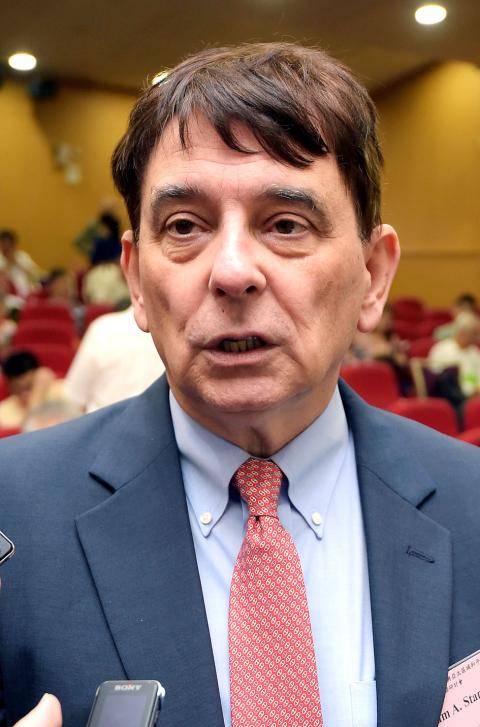The biggest failure of US President Barack Obama administration’s policy toward China was “ignoring and underestimating Taiwan,” former American Institute in Taiwan (AIT) director William Stanton told a Taipei symposium yesterday.
“The US policy toward China has been pretty consistent since 1972, but it does not mean our policies have been correct or successful,” said Stanton, who is now director of the Center for Asia Policy at National Tsing Hua University.
“In my view, US policy is often proved wrong with regard to China, and by ‘wrong’ I mean they failed to promote US interests or to achieve US goals,” he said.

Photo: Wang Min-wei, Taipei Times
In his speech, titled “US policy toward Xi Jinping’s [習近平] China,” Stanton said that the Cold War geostrategic argument that the US should cooperate with China to counterbalance a possible Sino-Soviet alliance was “proved wrong” by the continuing strengthening of Sino-Russian partnership on both military and diplomatic fronts.
“In the absence of shared values, geostrategic partnerships are inherently unstable,” Stanton said.
“You can have a geostrategic relationship between the US and the United Kingdom, maybe, which are two democracies. But do not depend on it if [the potential partner is] a communist autocracy and [you are] a democracy,” he added.
Another argument that calls for cooperation with China in order to resolve regional and global problems “has been largely illusory when you search for concrete positive outcomes from a US perspective” due to China’s size, power and status as a permanent member of the UN Security Council, Stanton said.
The economic argument, which expects increased trade with China and states that continuing improvement in the Chinese economy would facilitate political change, has started to be called into question, he said.
The assumption that the US economy has benefited from trade with China has also been rebuffed by studies, he added.
“Another US policy error from the start was ignoring Taiwan’s interests and underestimating its potential,” he said.
“If Washington policymakers in 1972 had foreseen [Taiwan’s evolution into a vibrant democracy and robust economy], perhaps they would not have written off Taiwan so easily, just as no one would have ever thought of abandoning Australia,” he said.
“A lack of knowledge about and understanding of Taiwan continues. Some of our key policymakers on China under the Obama administration have never even visited Taiwan, or visited it rarely, meeting with junior officials and academics,” Stanton said.
This partly explains why “some Washington observers were taken aback by the Sunflower movement [in the spring of last year] and reacted angrily,” he said.
“In my view, the biggest failure of the Obama administration’s policy toward China has been its handling of Taiwan. An example was the omission of any references to Taiwan in describing the US policy of a reorientation to Asia,” Stanton said.
He said Washington gave a “far more hospitable and objective reception of [Democratic Progressive Party Chairperson] Tsai Ing-wen [蔡英文] this year [than in 2011], and it was an “important positive step by Washington in support of an even-handed approach to, and support for, Taiwan’s democracy.”
Other key areas where the US needs to support Taiwan are “defense cooperation and trade,” Stanton said.
“While the US must cooperate [with China] where it can, it also needs to continue to be very clear about its own values and interests,” he said.
“While the US should never assume that China is necessarily an enemy, we should also always be aware that the China with which we now deal also does not regard us a friend either,” he added.

An essay competition jointly organized by a local writing society and a publisher affiliated with the Chinese Communist Party (CCP) might have contravened the Act Governing Relations Between the People of the Taiwan Area and the Mainland Area (臺灣地區與大陸地區人民關係條例), the Mainland Affairs Council (MAC) said on Thursday. “In this case, the partner organization is clearly an agency under the CCP’s Fujian Provincial Committee,” MAC Deputy Minister and spokesperson Liang Wen-chieh (梁文傑) said at a news briefing in Taipei. “It also involves bringing Taiwanese students to China with all-expenses-paid arrangements to attend award ceremonies and camps,” Liang said. Those two “characteristics” are typically sufficient

A magnitude 5.9 earthquake that struck about 33km off the coast of Hualien City was the "main shock" in a series of quakes in the area, with aftershocks expected over the next three days, the Central Weather Administration (CWA) said yesterday. Prior to the magnitude 5.9 quake shaking most of Taiwan at 6:53pm yesterday, six other earthquakes stronger than a magnitude of 4, starting with a magnitude 5.5 quake at 6:09pm, occurred in the area. CWA Seismological Center Director Wu Chien-fu (吳健富) confirmed that the quakes were all part of the same series and that the magnitude 5.5 temblor was

The brilliant blue waters, thick foliage and bucolic atmosphere on this seemingly idyllic archipelago deep in the Pacific Ocean belie the key role it now plays in a titanic geopolitical struggle. Palau is again on the front line as China, and the US and its allies prepare their forces in an intensifying contest for control over the Asia-Pacific region. The democratic nation of just 17,000 people hosts US-controlled airstrips and soon-to-be-completed radar installations that the US military describes as “critical” to monitoring vast swathes of water and airspace. It is also a key piece of the second island chain, a string of

The Central Weather Administration has issued a heat alert for southeastern Taiwan, warning of temperatures as high as 36°C today, while alerting some coastal areas of strong winds later in the day. Kaohsiung’s Neimen District (內門) and Pingtung County’s Neipu Township (內埔) are under an orange heat alert, which warns of temperatures as high as 36°C for three consecutive days, the CWA said, citing southwest winds. The heat would also extend to Tainan’s Nansi (楠西) and Yujing (玉井) districts, as well as Pingtung’s Gaoshu (高樹), Yanpu (鹽埔) and Majia (瑪家) townships, it said, forecasting highs of up to 36°C in those areas